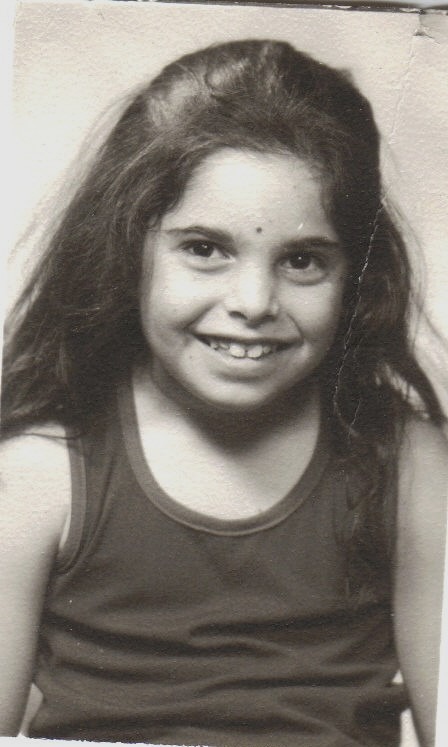Preface
July 1977
 “Why do you only have one finger?” The question was not new for me, but the environment was. My older brother, Peter, and I had arrived the night before to Olin Sang Ruby, a Jewish summer camp in Oconomowac, Wisconsin. In addition to Peter, my friends Josh and Daniel also came from our Synagogue for the two week-long program. Upon arrival, all of us were assigned to our cabins and introduced to our counselors and fellow campers. However, given that girls and boys were separated, I waived goodbye to my brother and friends and followed my group down a grassy path to the girls’ camp.
“Why do you only have one finger?” The question was not new for me, but the environment was. My older brother, Peter, and I had arrived the night before to Olin Sang Ruby, a Jewish summer camp in Oconomowac, Wisconsin. In addition to Peter, my friends Josh and Daniel also came from our Synagogue for the two week-long program. Upon arrival, all of us were assigned to our cabins and introduced to our counselors and fellow campers. However, given that girls and boys were separated, I waived goodbye to my brother and friends and followed my group down a grassy path to the girls’ camp.
The question came just as I was setting up my bedding. The girl who was assigned the top bunk over mine had been fascinated by my disfigured hands and shortened arms (never mind that she had yet to see my one-toed feet). I knew her question emanated from a place of natural curiosity. “Oh, I was just born this way.” Her name was Rachel and she proceeded to ask a few more questions about what I could and couldn’t do. I was used to questions from other kids who had never met me. I offered that, other than trouble tying my shoes (to which Rachel confessed neither could she), I couldn’t think of anything else I couldn’t do. After a bit, a few other girls joined our discussion. “I don’t think it matters how many fingers you have—can’t tie my shoes either!” said a tall girl named Sarah. “I can tie my shoes, but my Mom says I am not great at brushing my teeth yet.” Another girl named Ilana had joined the conversation and we all giggled together until the counselor, Rebecca, interrupted.
“Girls, mail’s here!” With excited anticipation, all of us waited as letters arrived from our parents. “Rachel! You have two…” Rebecca smiled. “I think one might be from your grandparents.” Letter by letter was handed out to different girls in our cabin, until Rebecca’s hands were empty. Finger count aside, I was the only one of everyone that was left empty-handed. Seeing my face on the verge of tears, Rebecca sprang into action and walked over to give me a warm hug. “Don’t worry, Meggie. I am sure you will be getting a letter really soon.” Unbeknownst to my Mom and Dad, it was the common practice for every parent to write letters to their kids that arrived in advance so the kids would have the notes before their first night away from home. Notwithstanding my counselor’s efforts to comfort me, I began to cry. Instantly, my newfound friends rushed up to me. “Here, Meggie. I don’t need two letters anyway. Take one. You can borrow it until you get one from your parents.” It was Rachel. “Meggie! Come over to my bed. Let’s decorate mine together with crayons.” Each girl in her own way made an effort to take out the sting. By lights out, I was ready to sleep, feeling happy. Although at the age of eight it hadn’t occurred to me, the fact that I had only one finger had actually broken the ice with the girls, allowing us to connect on a level we wouldn’t have otherwise.
 “Why do you only have one finger?” We were preparing to take Ethan back for his third summer at a Jewish sleep away camp and he was responding to my question about how other kids reacted to his physical difference the first time he came. “….that is basically what many asked me, Mom. I wasn’t shocked. I’ve heard that before and I’ll hear it again from people who haven’t met me….especially the younger kids. Actually, I kind of like when they ask since I can answer their question and then we can move on.” I was driving with him and his sister Savanna in tow, and with the aid of my rearview mirror, I looked at Ethan directly. “Well, remind me, what did you tell them?” “Same old, same old…that I was born this way.” I knew the answer but sometimes liked hearing it again.
“Why do you only have one finger?” We were preparing to take Ethan back for his third summer at a Jewish sleep away camp and he was responding to my question about how other kids reacted to his physical difference the first time he came. “….that is basically what many asked me, Mom. I wasn’t shocked. I’ve heard that before and I’ll hear it again from people who haven’t met me….especially the younger kids. Actually, I kind of like when they ask since I can answer their question and then we can move on.” I was driving with him and his sister Savanna in tow, and with the aid of my rearview mirror, I looked at Ethan directly. “Well, remind me, what did you tell them?” “Same old, same old…that I was born this way.” I knew the answer but sometimes liked hearing it again.
Earlier that morning I read an article by Alyson Kruger called, “No Body Talk Summer Camps.” The piece was about a couple who were driving their twelve-year-old daughter, Aviva, home from Eden Village Summer Camp last year and began to discuss how certain family members were particularly hairy. Sitting in the back seat, Aviva was perplexed why her parents would be discussing someone else’s physical appearance. She had spent the summer at a camp where staff members and campers follow something called the No Body Talk rule. According to Vivian Stadlin, its founder, “The specific rule is while at camp, we take a break from mentioning physical appearance, including clothing….be it negative, neutral or even positive.”
As I continued to read Kruger’s piece, other parents of children attending the camp were equally supportive of the notion of their children avoiding the subject of appearance. According to another mom, “The camp’s No Body Talk rule makes [the camp] this wonderful, utopian kind of place where you’re not judged on anything except your spirit.” Kruger added that Eden Village was not a pioneer in this regard, and in fact a chain of day camps had already initiated the No Body Talk rule as well. There was clearly a reason it had been catching on; the positive reactions even come from other campers. Offered one fourteen-year-old, “People really like me for who I am and not what I look like, and people actually pay attention to the sort of person that I am,” she said. “Your dress isn’t really you, it’s just something you bought. But whether you are a good friend, that’s truly you.”
Although I could see how the No Body Talk rule may be appealing, I began to feel queasy at the thought of sending my children to such an environment. While I more than appreciate the desire for parents to encourage their children to focus on what’s on the inside, I have a different perspective. In my experience living my own life and parenting children like me with bodies that clearly offer something to talk about, putting a muzzle on any conversation about our difference is ultimately a negative, at least for kids. In fact, one of the very reasons I added the “Kids Flaunt” and “Teen Flaunt” features to my website was to actually get the conversation about difference going.
As I continued to read, I noted several psychologists interviewed that agreed with me, believing that the spread of the No Body Talk rule could lead children to bury important issues that need to be discussed. “Precisely because the focus on physical appearance is so pervasive, the conversation should be had,” said Lisa Morse, a clinical psychologist in New York City who works with many parents of teens. “Difficult and uncomfortable issues don’t go away because people hope they will. And they don’t go away because they are ignored.” Jill Lewis, a clinical social worker in New York City who specializes in helping women with eating disorders, agrees. “It’s like not eating carbs,” she said. “You’re going to crave it, you’re going to want it, and you still feel this need to have a conversation about it and then you are not. And eventually you do it unhealthily.”
After we parked, and as I sat watching Ethan and Savanna run around together at a nearby park, it occurred to me that if the camps to which we were sending our kids imposed such a rule, I would be reluctant to send them back. To me, if we gag kids in their natural environment and they can’t learn to manage one another’s reactions, then we inhibit their growth. It reminds me of the parent who whisks their kid away from someone who looks different because they sense the kid is about to say or do something awkward or embarrassing. For me, every time our boys have the opportunity to engage, even about their physical self, the conversation then (and only then) leads to an authentic discussion with more depth. And, as I have always taught them, people’s reactions to their difference, good or bad, offer an opportunity to discover who will be a good friend and who they shouldn’t waste their time knowing.
For whatever reason, it seems that Dr. Morse and I are on the same page. In the article, she worried that because body talk has been eliminated from the table completely in places like Eden Park, children are not learning how to deal with comments that may make them feel uncomfortable, something that happens often in life. “Kids need to learn how to process these feelings, not how to push them away,” she said. “And I think it’s a perfect opportunity in a summer camp. Where else are they learning how to deal with it productively?”
 Having gone to sleep-away camps myself, I actually credit those experiences for helping me to learn to manage the reactions of curious children. Let’s face it, just as my parents couldn’t always be around for me, my husband John and I can’t always be around for our kids. By choosing to send Ethan to sleep-away camp and Charlie to day-camp to fend for themselves, we are purposefully putting them into an environment that encourages rather than stifles emotional growth. Now those experiences are something to write home about.
Having gone to sleep-away camps myself, I actually credit those experiences for helping me to learn to manage the reactions of curious children. Let’s face it, just as my parents couldn’t always be around for me, my husband John and I can’t always be around for our kids. By choosing to send Ethan to sleep-away camp and Charlie to day-camp to fend for themselves, we are purposefully putting them into an environment that encourages rather than stifles emotional growth. Now those experiences are something to write home about.


